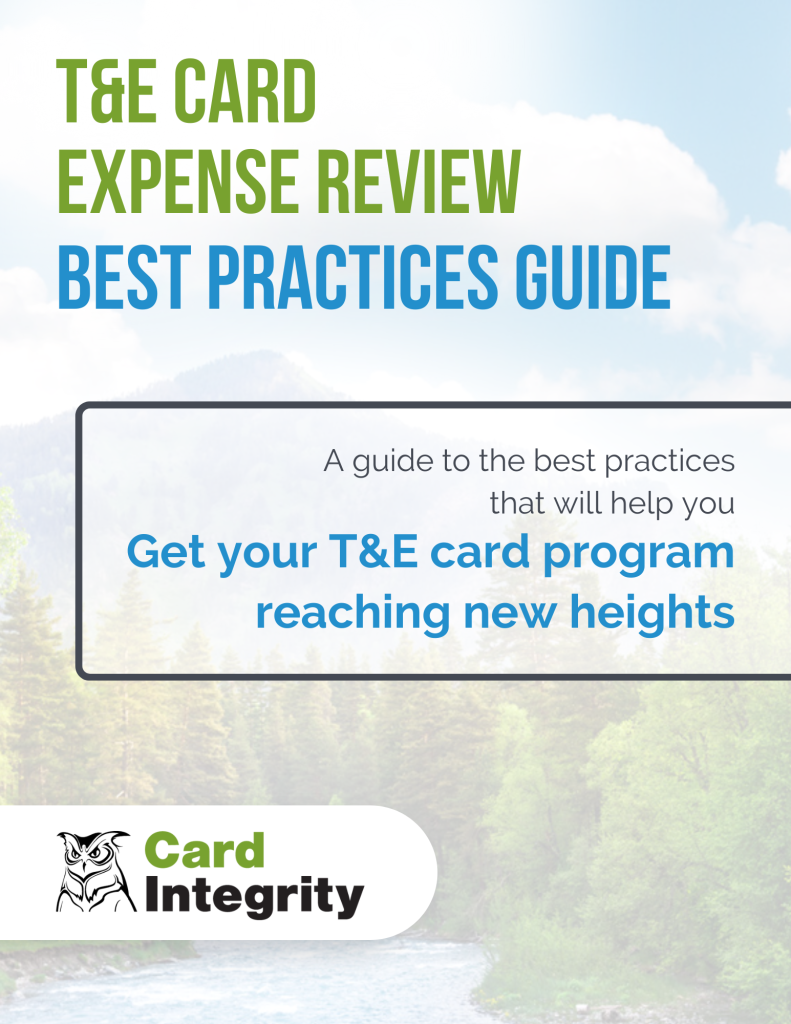Weaknesses in a travel card program
So, you have a travel card program. It’s pretty secure, you’d say, or at least it seems so. There’s a policy put in place, and you have approvers responsible for looking over and approving expenses. And, you have someone checking over all those receipts, too.
But then you take a look at all of the cases of employee fraud, embezzlement, and other unsightly stories that seem to crop up nearly every week. It’s likely you’ve heard of a few cases of this close to home, as it is a national problem not unique to any particular part of the world. But that couldn’t happen at your organization, right?
If you’re reading this and thinking, “Well, it definitely COULD happen, if somebody were determined enough”, you’re not alone. You likely know that the bare minimum—having a policy, and people responsible for looking things over—isn’t enough. And this is for several reasons.
There isn’t enough time for manual review
Your approvers are likely manager- or higher-level employees that, frankly, aren’t going to dedicate the same amount of time to looking over travel expenses and receipts as they give to their day-to-day duties. It could be because they trust their direct reports, because they lean very heavily on other ‘set it and forget it’ controls your company might have in place like point-of-purchase AI fraud detection, or because they simply feel that they have other more pressing needs to get to. That’s not to say all of, or even most of, your employees are letting things slide or not looking carefully at the submissions. It’s just to say that the incentive is there to be less-than-perfect in their review.
And the fault for that shouldn’t lie solely on the approver, either. It’s a fault of the travel card program itself. A marketing manager was likely hired for their ability to create and manage marketing campaigns. A sales manager was hired for their ability to get leads and close deals. Not to look over expense reports. There exist more efficient ways to handle these expense reports that benefit all parties involved.
Policy can be confusing
When we say that approvers trust their direct reports, we aren’t implying that trust is misplaced. Oftentimes, policy violations are honest mistakes. They can be born from a misunderstanding of policy, or a lack of proper guidance in how to navigate a particularly complex policy.
They can also be the result of the type of gaffes all of us are prone to. For example, accidentally tapping your corporate travel card instead of your personal Visa at the grocery store because they look similar. It happens, but there are methods to make it less likely to happen.
Weak internal controls invite people to take advantage
And of course, some policy violations are not honest mistakes. Check out some of these statistics from the ACFE’s (Association of Certified Fraud Examiners) yearly Report to the Nations, these findings from the 2024 report:
- Median loss per fraud case: $145,000
- Average loss per case: $1.7 million
- 84% of fraudsters displayed at least one behavioral red flag
Fraud is not only prevalent, rampant, and destructive when it happens. It also takes a long time to catch on average. According to the same 2024 Report to the Nations, it takes at least 12 months on average to detect occupational fraud.
These issues can be attributed to a very simple root cause: weakness in an organization’s travel card program.
It’s not always about fraud and misuse
Fraud certainly draws the headlines and is probably the source of the most angst and anxiety regarding travel card programs. But there are more considerations to strengthening your travel card program than shoring up internal fraud controls.
For example, you likely know that many travel card companies provide value back to the organization via rebates, hotel points, and frequent flyer mileage. Qualifying for those cash rebates may not be a foregone conclusion, and may require setting benchmarks, and reporting on those benchmarks to ensure you’re hitting those quotas month-to-month to qualify for those rebates.
Does the situation above apply to your organization? Do you have somebody creating reports to benchmark travel card rebate data? Now we’re talking about people in your finance department. Maybe your organization has a dedicated travel or T&E card manager, maybe you don’t. Maybe that responsibility would fall under someone in procurement, or sourcing, or a similar title. These reports and benchmarks would provide tangible benefits to your organization, but now it’s a question of whose responsibility they are to create, and if that person has the resources to do it regularly.
The MCC problem
And that’s just one example of where a travel card program could show weakness. Take the example of merchant category codes, or MCCs for short. At their concept, they’re a great idea. The major credit card companies use MCCs to categorize transactions into different transaction types. For example, there exist MCCs for everything from electrical contractors to clothing stores to restaurants to pawn shops. Let’s look at Citibank’s MCC list as an example. They can get arbitrarily specific, such as code 5598 for snowmobile dealers, to incredibly broad, such as code 5399 “miscellaneous general merchandise stores”. These codes can be used to limit purchases on travel cards by blocking certain categories.
You may already start to see the cracks in the foundation. The problem with MCCs is that they aren’t perfect. Far from it, in fact. In addition to being overly broad at times, MCCs are frequently just wrong. Take the largest online retailer for example—Amazon. MCCs still categorize the massive corporation as a ‘bookstore’. That may have been an accurate descriptor in the 90’s during the company’s early days, but clearly, it is no longer relevant. Businesses change and grow, Amazon is just a very notable example.
So what can you do?
There are ways to reinvent your travel card program to be stronger at its foundation. Each of the problems discussed above can be solved, and at Card Integrity, that’s exactly what we do.
- You don’t have to rely on manual review. With Card Integrity’s DataWISE Expense Monitoring service, we become an extension of your team and handle the transaction review and report construction for you.
- Card Integrity’s ReceiptWISE service provides complete review of your organization’s receipts.
- Over-reliance on point-of-purchase controls can instill a false sense of security within your travel card program. These point-of-purchase controls are often based on the previously-discussed unreliable MCCs, and do not block every instance of non-compliant behavior, like split transactions.
- Use card sleeves or unique designs on your travel cards that use your organization’s branding, so that cardholders don’t mix it up with their personal cards.
- Card Integrity’s TrainingWISE trains your cardholders on proper policy adherence so that “I didn’t know” is no longer an excuse.
- Card Integrity’s DataWISE service reviews your expense and spend data for over 350 behaviors and flags them for review, while providing additional visualized data like rebate benchmark reports.
- Card Integrity uses Level III data, a more reliable way to gather information on transactions, doing away with the reliance on MCCs.
Card Integrity monitors travel card programs for universities, government institutions, corporations, and non-profit institutions. For more insights on strengthening your travel card program, check out our free T&E eGuide below!




